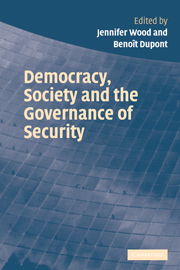Book contents
- Frontmatter
- Contents
- List of contributors
- Foreword
- Acknowledgements
- Introduction: Understanding the governance of security
- 1 Reflections on the refusal to acknowledge private governments
- 2 Transnational security governance
- 3 Two case studies of American anti-terrorism
- 4 Power struggles in the field of security: implications for democratic transformation
- 5 Policing and security as ‘club goods’: the new enclosures?
- 6 The state, the people and democratic policing: the case of South Africa
- 7 Necessary virtues: the legitimate place of the state in the production of security
- 8 From security to health
- 9 Research and innovation in the field of security: a nodal governance view
- Conclusion: The future of democracy
- References
- Index
Foreword
Published online by Cambridge University Press: 22 September 2009
- Frontmatter
- Contents
- List of contributors
- Foreword
- Acknowledgements
- Introduction: Understanding the governance of security
- 1 Reflections on the refusal to acknowledge private governments
- 2 Transnational security governance
- 3 Two case studies of American anti-terrorism
- 4 Power struggles in the field of security: implications for democratic transformation
- 5 Policing and security as ‘club goods’: the new enclosures?
- 6 The state, the people and democratic policing: the case of South Africa
- 7 Necessary virtues: the legitimate place of the state in the production of security
- 8 From security to health
- 9 Research and innovation in the field of security: a nodal governance view
- Conclusion: The future of democracy
- References
- Index
Summary
This is a timely book that echoes important developments occurring in other fields. Pluralism in law is now an important trend in legal theory. The ‘anchored pluralism’ for which this collection of essays is arguing may also become a thread running through various innovative approaches to the theory and practice of security.
The book has a theoretical and a pragmatic focus and it succeeds in many things. I will mention four of these. First, it is a welcome exercise in conceptual analysis, as it tries to spell out the meaning of a new set of joint notions – governance, node, pluralism and the governance of security, just to mention a few – that are taking an increasing place in theoretical discourse. The authors make a convincing case that these concepts are the building blocks of a robust perspective that future research will have to take into account.
Second, the essays go far beyond definitional issues and the explanatory power of their key notions is truly put to the test. One such key notion, which is approached from different angles in the book, is that of ‘nodal governance’. This notion implies that power flows from a nexus of connected – but not necessarily co-ordinated – agents rather than from a single well. Despite its trendy garb, nodal governance may prove to be a useful tool, as it allows us to overcome two obstacles to building a new paradigm for reflecting upon the exercise of power.
- Type
- Chapter
- Information
- Democracy, Society and the Governance of Security , pp. ix - xPublisher: Cambridge University PressPrint publication year: 2006
- 2
- Cited by

